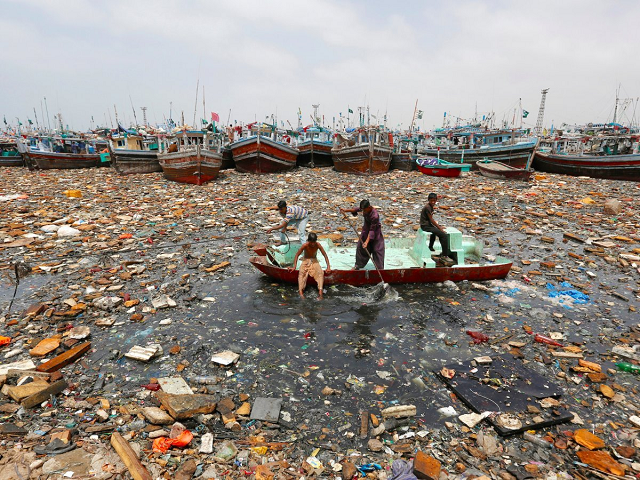Sailing through a sea of trash
Disposal of plastic waste, sewage water in sea places hurdles in way of sailors

Muzammil Hussain, a sailor, would yearn to visit Karachi during childhood just to get a glimpse of the sea- one of the first, if not the first, loves of his life.
You see, there is no sea in the hilly tribal areas he hails from.
Now, after having participated in international sailing contests and living in Karachi, Hussain is as close to the sea as possible - a sea of trash.
"Plastic bags and bottles littering the city's sea will stay there for the next 200 years," he said with worry. "The government needs to place a ban on plastic items, which are a major threat to marine life."
Besides having environmental concerns, Hussain and other sailors passionate about the sport are agonised as they witness their playing field getting sullied.
According to Qasim Abbas, a sailor from the Pakistan Navy and a national champion of the sport, a significant rise has been observed in marine pollution within Pakistan's maritime boundaries since 2008.
"This poses a problem not just to the [survival] of marine life, but to the sport of sailing as well," said Abbas. "Garbage floating in the sea poses a hurdle in the way of boats, hampering their swift movement, and it becomes particularly difficult to change the direction of the boat when a plastic bag gets entangled with the steering [wheel]."
It is estimated that around five million gallons of sewage water is released into Karachi's sea daily, besides 4,000 tonnes of garbage being dumped in the vast water body every day. Moreover, waste, as well as oil, from vessels docked at Karachi port is thrown away into the sea.
"It is especially during rains that excess, dirty water, along with trash, from the Lyari River flows into the sea, in turn littering all water channels connecting the sea to ports and jetties," said Abbas expressing his concern.
Given the situation and the apparent non-implement of environmental laws and regulations, sailors fear that the sea may be rendered useless for practicing and playing the sport in the future.
"We have many hard working sailors in Pakistan, but given the worsening condition of the sea, they are likely to have a tough time [practicing for the sport] and winning [tournaments]," explained Abbas.
He said sailors needed to practice the sport for at least three to four hours every day, appealing to the government to address the issue of the sea getting polluted and urging citizens to stop littering the sea.
"This is needed to ensure that this precious gift of nature is transferred to coming generations in its purest form," stressed Abbas. "Pakistan is blessed with one of the best coasts and it is our responsibility to preserve it, so that we may continue to benefit from it."
Sailing boats
Sailors employ different kinds of boats to cruise on the sea. These are categorised into three broad types, namely keelboats, windsurfing boats and dinghy boats.
Of these, keelboats are usually used by players participating in a tournaments as teams. These are also used for practicing the sport and training players.
Laser-16 boats are used for training amateurs and Optimists are used for imparting the skill of sailing to children.
Another kind, called sailboats cost between Rs6 million to Rs7 million, and their sails- tensile structures made of membrane material that relies on wind power to propel the boat- are put up vertically. Sailors change sails' direction to manoeuvre boats' movements.
Then there is the spin boat that is bigger in size but lighter in weight.
Windsurfing boats are suitable for sailing through high tides.
There are two kinds of windsurfing boats- the RSX and mistral.
While mistrals are no longer used internationally, RSX continues to be used in the Olympics. However, there are very few players in Pakistan who are skilled to sail RSX boats.
Sailing - the sport
Presented with a range of equipment to practice his passion- sailing- Hussain finds it different than any other sport.
"It builds ones physical strength and mental prowess. It trains you to make quick decisions," he said, his zeal for sailing apparent in his voice. "We sense the tides as they rise and fall, we feel the wind change its direction. Then, we, as a team, coordinate [to cruise our way to success]," he explained.
Popularising the sport
There is no age restriction when it comes to sailing, said Abbas. Even 50-year-olds can participate in it if they are fit and active, he added.
Saying that children too were inclined towards taking up sailing, he lamented that it was just the Pakistan Navy and Pakistan Air Force that had been actively promoting the sport in the country.
"Then there is the fact that equipment needed for sailing is costly, which further keeps many away from the sport," he said, adding that it was due to a lack of resources invested in sailing that Pakistan was not able to participate in international tournaments other than those held among just Asian countries.
If players have access to adequate resources and can dedicate three to four daily to practicing sailing for a year, they can compete at the national level, and after participating in national events for a year, they can proceed to competing in international tournaments, he opined.
"Pakistan can participate in Olympics and other international tournaments if the government invests resources in sailing," he said.
Hussain, too, is of the opinion that youngsters, by practicing sailing, can strengthen physically and mentally, but only if the government promotes it.
Published in The Express Tribune, December 28th, 2020.



















COMMENTS
Comments are moderated and generally will be posted if they are on-topic and not abusive.
For more information, please see our Comments FAQ